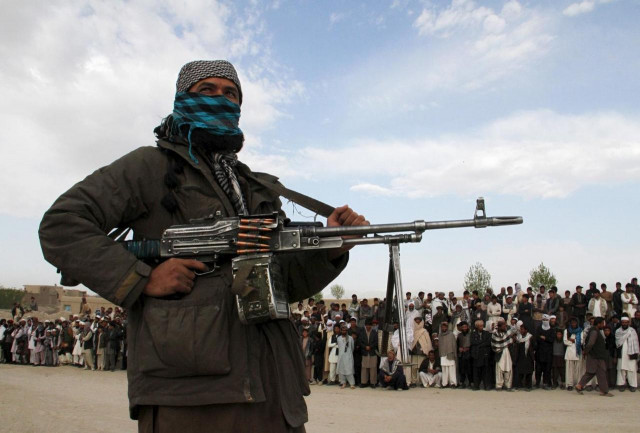UN report highlights Afghanistan-based TTP threat to Pakistan
TTP constitutes the largest component of foreign terrorist fighters in Afghanistan, says Security Council report

A new United Nations report has once again highlighted the threat posed to Pakistan by the Afghanistan-based Tehreek-e-Taliban Pakistan (TTP), the terrorist group which has conducted numerous deadly “cross-border” attacks and operations.
The report — 13th in the series — by the UN Security Council Monitoring team on Afghanistan states that the that TTP remains focused on long-term campaign against the Pakistani state with its several thousand fighters in Afghanistan.
“TTP constitutes the largest component of foreign terrorist fighters in Afghanistan, with their number estimated to be several thousand, according to the report released on Friday.
“TTP has arguably benefited the most of all the foreign extremist groups in Afghanistan from the Taliban takeover. It has conducted numerous attacks and operations in Pakistan…”
“The presence of ‘several thousand’ TTP fighters in Afghanistan, as stated in the latest UN report, quite understandably poses a serious and credible threat from Pakistan’s perspective,” a European diplomat told APP on the condition of anonymity.
The UN Monitoring Team’s earlier report had focused on the global threat posed by al Qaeda, Da’esh and related groups as well as the one before that had also underlined increasing cross-border attacks by TTP from the Afghan soil as result of the reunification of the terrorist group in Afghanistan.
Also read: TTP extends ceasefire till May 30 after 'successful' talks
On its part, Pakistan had shared a dossier with the UN Security Council, containing evidence of financial and material support provided by Indian intelligence agencies to TTP to conduct cross-border terrorist attacks against Pakistani military and civilian targets.
TTP was also responsible for the heinous attack on Army Public School in Peshawar in which over 150 children were killed.
Separately, quoting information provided by a “Member State,” the Monitoring Team report mentions the presence of defunct Lashkar-e-Tayyiba (LeT) and Jaish-e-Mohammed (JeM) in Afghanistan, something its several previous reports did not have.
However, ever since becoming a member of the UN Security Council in January 2021, India has been repeatedly criticising the UN Monitoring Team in public as well as reportedly in the closed meetings of the UN for not including specific references to these groups in the UN reports. On February 14, 2022, during a public meeting of the Counter Terrorism Committee (CTC), which India currently chairs, it’s representative publicly slammed the UN Monitoring Team on the same issue, stating that the UN reporting mechanism was “plagued by political biases.”
While the reference to LeT and JeM in the latest report appears to be an attempt to respond to the Indian pressure and criticism, diplomatic observers say that the Monitoring Team has apparently steered clear of owing any evidence of the presence of these defunct groups in Afghanistan by ascribing the information to a certain Member State.
At the same time, the report also anonymously mentions another Member State according to which “there is no evidence of the presence of LeT and JeM in the region.”
According to diplomats familiar with the work of the UN Security Council sanction committees, India’s efforts to push its domestic political agenda in the technical work of the committees, including by pressurising members of the UN Monitoring Team, is a cause of concern for many Council members, including India’s close allies.
Such politicised measures, according to these diplomats, are undermining the credibility of the UN bodies, impacting their work, and diverting attention from the real terrorist threats being faced by the region.
Some analysts also say that Indian tactics were part of a broader strategy to deflect increasing criticism aimed at India’s atrocities, and gross violations of human rights abuses in Indian Illegally Occupied Jammu & Kashmir (IIOJK) as well as mainstreaming of Islamophobia in its political discourse.
Also read: Pakistan asks Afghan Taliban to take TTP ‘as test case’
India has repeatedly used the bogey of terrorism to divert attention away from its domestic persecution of Muslims as well as state terrorism in IIOJK, it was pointed out.
India’s strong opposition to the UN initiatives aimed at addressing the issue of Islamophobia as well as terrorist attacks being carried out against Muslims and their places of worship on that basis, shows that the agenda of India’s supremacist terrorist organisations like RSS has become a foreign policy priority for India, analysts say.
Because of its domestic political environment, India tried to block consensus in the United Nations General Assembly on the 7th Review of the UN Global Counter Terrorism Strategy (GCTS) which called upon member states to take appropriate measures to address Islamophobia as well as terrorist attacks on the basis of Islamophobia, and xenophobia.
Despite Indian opposition, the UN Strategy was adopted by the UN General Assembly by consensus.



















COMMENTS
Comments are moderated and generally will be posted if they are on-topic and not abusive.
For more information, please see our Comments FAQ